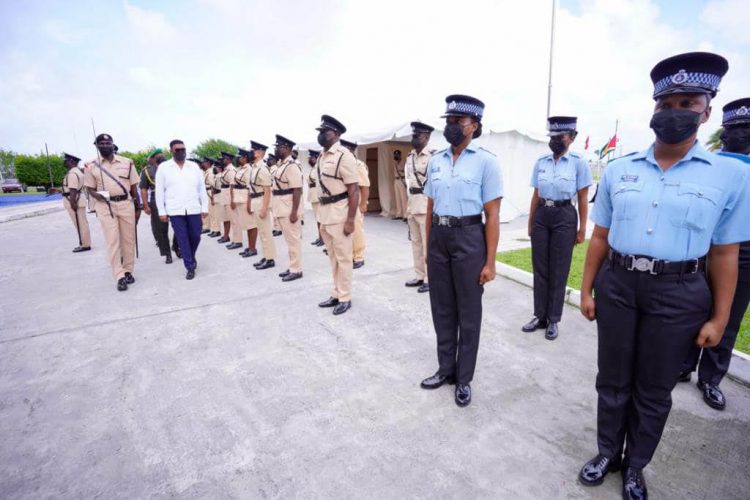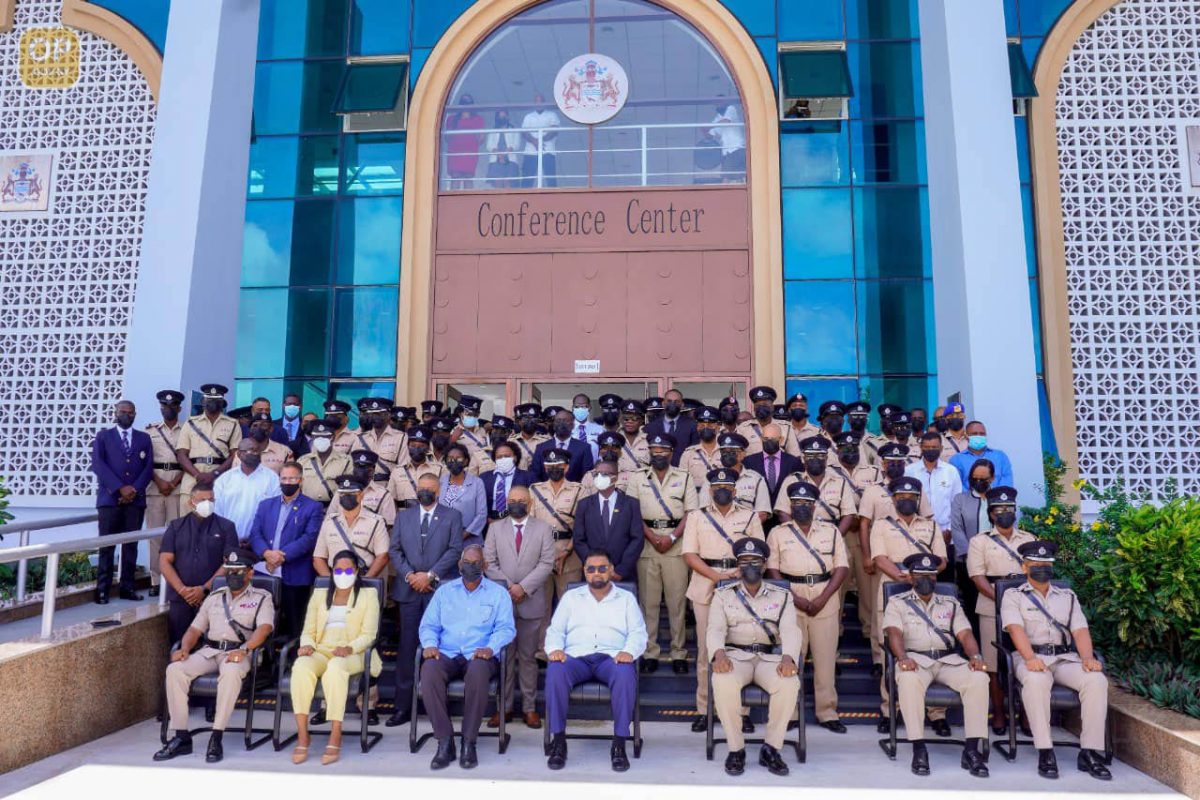Saying that the country’s security needs to be boosted, President Irfaan Ali yesterday charged the Guyana Police Force (GPF) to “up its game” particularly as it relates to crime fighting to meet the needs of the country in light of the economic expansion and transformation that is occurring.
“….The Guyana Police Force must up its game. The streets, communities, homes and businesses must become safer places, much safer. We are going to invest in you. We are going to invest in the infrastructure and assets that is needed and more importantly we are going to invest in the people of our country to ensure that they feel a part of what is happening,” Ali said.
He was at the time delivering the feature address at the Opening of the GPF’s Annual Officers’ Conference which is being held from March 10th to 12th under the theme ‘Promoting improvement of public trust and confidence, maintaining safety and security through competence, professionalism and partnership’.

While acknowledging the work done by the police over the last year, Ali said much more needs to be done.
“The force needs all the help it can get. It is no secret that the Guyana Police Force is operating below establishment. It is also known that given the size of Guyana it is impossible for police divisions to have a physical presence in every community,” he said.
According to Ali, the force is being strengthened and recapitalized to better combat crime. “Our intention is to provide policemen and women with the tools to do their job better. We can give and present the best facilities, the best environment for work but we cannot present or change the attitude unless at an individual level we understand what is the attitude that is required for effective policing,” he said.
He added that the regionalization of the force is being strengthened to ensure “stronger” regional divisions which can be more responsive to crime. “….It can no longer be business as usual when it comes to policing…..We cannot continue on the same trajectory. There must be more rapid improvement to the work of the force,” Ali stated.
According to Ali, there is no place for brute force and ignorance in the force as he pointed out that the Government is investing in the professional development of ranks.
“A better trained force will be in a much stronger position to deliver the results which are required. We are striving for a police force which embraces professionalism. There can be no place for brute force and ignorance in policing. It is also unacceptable for the police to be rude and ill-mannered to the public,” Ali said.
“…Sometimes we believe that shouting in a police station is the right attitude….but communication can be effective through different forms. You can be able to get far more information based on your approach,” he added.
Ali said he has requested that the discussions over the next two days include the development of a policy on an incentive-based performance system for the force. “….Whilst we have an average time of five, six years of persons moving up he ranks, there must be a mechanism in which emoluments is affected (by) other than promotion,” he said.
Discussions are also ongoing for the establishment of a regional police academy and a digital ticketing system on all the new highways. “Where we can move towards digital ticketing and recognition in terms of speeding, in terms of seat belt violations and so on and that system must be automatically linked to the suspension of licences and so on,” Ali said.
“We now have to make the laws work. We have a lot of modern laws that is there, I won’t say ineffective but it is not giving us the results because the system is not in place to allow the law to give us the results that is needed,” he noted.
Technological advancement
In an effort to improve public security, the Commander-in-Chief of the Armed Forces said that the Government will be investing in the technological advancement of the force.
“Technology has the potential to be a game changer in policing. Over the past few years, we have seen how CCTV cameras have positively impacted our crime fighting strategy. The police have been able to utilize footage often from private businesses and homes to help detect crime and to identify those involved in carrying out criminal activities,” Ali said.
In order to boost crime fighting, he said the Safe City programme is being resuscitated and expanded. “Our objective is to eventually connect the entire country with CCTV cameras and to have these centrally monitored. Information technology will be used to assist our police planners to better map crime and utilize analytics as a crime fighting tool. Face recognition and vehicular license plate technologies will also be utilized to intercept law breakers,” the President explained.
He further revealed that technology is also expected to be deployed to improve safety on the country roadways. “The reckless use of our roads must be bought to an end. We cannot continue to lose our precious human resources to preventable road accidents. Our roads are for moving people safely around. They are not racing circuits,” Ali said.
Fixed speed radars will be installed on the roadways to identify and photograph “reckless” road users. “This will be a costly investment but one that is absolutely essential to stem road carnage,” Ali said.
With the intention of modernising the force’s crime fighting capability, Ali stated that its forensic and investigative capacity will also be enhanced. “Greater use of forensic and investigative tools will make it much easier for detectives to solve crimes,” he added.
Ali pointed out that among the standards which citizens are entitled to is a fast response. “For too long we have reports about slothful response to crime by the force. Our intention is to improve the force communications and operational readiness so as to ensure a system of rapid response to crime reports,” he noted.
The issue of the slow response, he said will be addressed by ensuring that every policing division is eventually equipped with modern communications systems and an adequate fleet of vehicles.
Public trust and confidence
While saying that he is satisfied with the efforts that have been made over the past year to reposition the force and improve community relations, Ali stress-ed on the issue of public trust and confidence which he said is a key component of policing.
“There have been some incidents which have bought the force into disrepute and which have hurt its attempt to improve its relationship with the public,” he said.
He said that he anticipates that during this year there will be a more concerted and focused effort to develop a medium to long-term strategy aimed at improving the image of the force.
“I look forward to interventions to boost public confidence in the work of the Guyana Police Force. The police must improve its relations with the communities and citizens. The public is also obligated to support the work of the force. If there is mistrust in these relations, public order will be under threat because the police will be unable to solicit the degree of support it needs to effectively execute its lawful mandate,” Ali explained.
An effective crime prevention strategy, he said requires the force to make societal interventions to reduce the incidents of crime. “Over the years, the Guyana Police Force has been addressing risk groups and working with them to reduce the threat. Behavioural threats and also offering them an alternative pathway,” he noted.
Ali further stated that the force has positioned itself as a “catalyst for change.” He said one of their “tremendous” accomplishments over the last year is the extremely “great” results as a result of coordination between the security entities and other bodies.
“I want to assure the Guyana Police Force that the Government would back them with livelihood options, will back them with the necessary tools to give these communities an alternative and help them to be incorporated into the mainstream economy,” he said.





